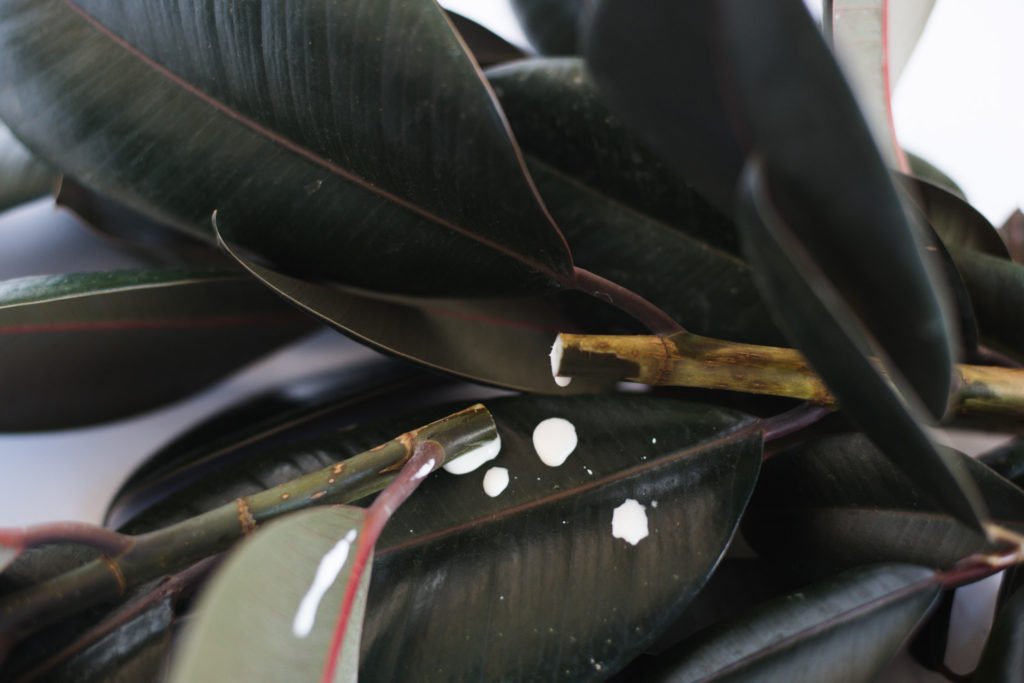Are burgundy rubber plants toxic to cats black sheep endp. Yes, rubber plant is toxic to cats.
Rubber Plant Cats, The problem is that the sap that the tree lends its name from can cause problems in pets when ingested. How much of each part is eaten by your pet will determine how big an impact they have.

Baby rubber plant (peperomia) note: The toxic principles are ficin and ficusin that are enzymes present in the milky sap leading to skin and gastrointestinal irritation. The reactions induce complications such as vomiting, diarrhea, swelling in the gi tract, and upper respiratory pathway. The baby rubber plant’s larger cousin, the rubber tree (or ficus benjamina), is actually toxic to dogs and cats.
Other rubber plants, such as the japanese rubber plant, are among the plants toxic to cats and dogs, and may cause diarrhea, vomiting, depression and lack of coordination.
Don’t confuse the with ficus benjamina (indian rubber plan or weeping figs, which are poisonous to cats and dogs. Rubber plants are toxic to cats, and you should contact your veterinarian if your cat has ingested this plant. But they can still cause severe irritation of the mouth, digestive system, and even the skin. According to the aspca, contact with the skin can cause dermatitis, while ingestion can cause oral irritation, salivation and vomiting. In this article, we will talk in detail, that how rubber plants affect cats, and why you should keep them both away from each other. For some reason rubber plants were never a plant i could keep alive.
 Source: pinterest.com
Source: pinterest.com
Pick up the same amount of mulch from us for just. Is peperomia obtusifolia poisonous to cats? We will talk about that and more in this article. Other rubber plants, such as the japanese rubber plant, are among the plants toxic to cats and dogs, and may cause diarrhea, vomiting, depression and lack of coordination. It is commonly known as.
 Source: pinterest.com
Source: pinterest.com
If your cat has not vomited, activated charcoal may be administered by the veterinarian.if the stomach has undergone irritation from consuming the indian rubber plant, the veterinarian may administer kapectolin, a product that provides a thick coating to the stomach wall. It can also lead to mouth or gut irritation and allergies in some instances. If you have identified the.
 Source: etsy.com
Source: etsy.com
The symptoms may not last long, but they will soon be gone. It can also lead to mouth or gut irritation and allergies in some instances. When a part of an indian rubber plant’s root is eaten or chewed, this sap can be released. It is commonly known as the rubber plant or the fig. Baby rubber plant (peperomia) note:
 Source: leafandpaw.com
Source: leafandpaw.com
Chewing or consuming a portion of the indian rubber plant releases this sap, causing skin irritation to upper and lower digestive system (mouth, stomach, and intestines). It is commonly known as the rubber plant or the fig. For some reason rubber plants were never a plant i could keep alive. If your cat eats any rubber plant material, it may.
 Source: non-toxicplantsforcats.blogspot.com
Source: non-toxicplantsforcats.blogspot.com
Yes, rubber plant is toxic to cats. Following ingestion, irritation of the mouth and gastrointestinal tract may occur. Other rubber plants, such as the japanese rubber plant, are among the plants toxic to cats and dogs, and may cause diarrhea, vomiting, depression and lack of coordination. In respect to this, are rubber plants toxic to cats? Decreased appetite, drooling, vomiting,.
 Source: pinterest.com
Source: pinterest.com
Rubber plants are mildly toxic to cats and dogs. Baby rubber plant (peperomia) note: Never had to worry about cats getting to them, i killed the plants first. We will talk about that and more in this article. Although considered a medicinal plant for humans, aloe vera�s level of toxicity is mild to moderate for cats and dogs.

Decreased appetite, drooling, vomiting, diarrhoea, depression, skin irritation. Is peperomia obtusifolia poisonous to cats? A safer alternative to the rubber plant (which can cause mild toxicity to humans and pets), the baby rubber plant is native to florida and the caribbean. Rubber plants are mildly toxic to cats and dogs. Not something likely to cause severe illness, but still not.
 Source: awescats.blogspot.com
Source: awescats.blogspot.com
The toxic principles are ficin and ficusin that are enzymes present in the milky sap leading to skin and gastrointestinal irritation. The milky sap known as latex released by a damaged a rubber plant (ficus elastica) is poisonous to cats. Pipericeae blushing bromeliad (crimson cup, marbled fingernail, blushing bromeliad, ossifragi vase, miniature marble plant, aregelia) | scientific names: Ficus is.
![Are Rubber Plants Toxic To Cats?? [ANSWERED] Eden Indoors Are Rubber Plants Toxic To Cats?? [ANSWERED] Eden Indoors](https://i2.wp.com/www.edenindoors.co/wp-content/uploads/2020/08/pexels-scott-webb-1903964.jpg) Source: edenindoors.co
Source: edenindoors.co
A pet safe relative to the ficus elastica is peperomia(below), which is safe for cats and dogs. Are rubber plants toxic to pets such as cats, dogs, birds, and other small pets? According to the aspca, contact with the skin can cause dermatitis, while ingestion can cause oral irritation, salivation and vomiting. In this article, we will talk in detail,.
 Source: petpoisonhelpline.com
Source: petpoisonhelpline.com
Are rubber plants toxic to pets such as cats, dogs, birds, and other small pets? Clinical studies have shown that rubber plants can be harmful to cats. Rubber plants can be toxic to your pets including dogs and cats. Cats are poisoned by latex, a milky sap secreted by a damaged rubber plant (ficus elastica). The toxic substance in most.
 Source: awescats.blogspot.com
Source: awescats.blogspot.com
However, is rubber plant toxic to cats? While these plants are not as toxic as some other species, and the reaction is typically not fatal. A pet safe relative to the ficus elastica is peperomia(below), which is safe for cats and dogs. Are burgundy rubber plants toxic to cats. Ficus is a genus of 850 species of mostly tropical trees,.
 Source: awescats.blogspot.com
Source: awescats.blogspot.com
Is peperomia obtusifolia poisonous to cats? A safer alternative to the rubber plant (which can cause mild toxicity to humans and pets), the baby rubber plant is native to florida and the caribbean. While these plants are not as toxic as some other species, and the reaction is typically not fatal. The problem is that the sap that the tree.
 Source: decoist.com
Source: decoist.com
Are rubber plants toxic to pets such as cats, dogs, birds, and other small pets? Rubber plant ( ficus elastica) is toxic to cats. Following ingestion, irritation of the mouth and gastrointestinal tract may occur. Rubber trees or plants contain proteins that they use to deter the attacker, which could be anything, diseases, insects, or a curious cat or dog..
 Source: ruangbelajar-067.blogspot.com
Source: ruangbelajar-067.blogspot.com
A safer alternative to the rubber plant (which can cause mild toxicity to humans and pets), the baby rubber plant is native to florida and the caribbean. Baby rubber plant (peperomia) note: Some rubber tree plants (such as japanese/chinese/jade rubber plant and indian rubber plant) are toxic to cats and dogs. The poisonous sap of the rubber plant affects birds.
 Source: pinterest.com
Source: pinterest.com
Clinical studies have shown that rubber plants can be harmful to cats. But they can still cause severe irritation of the mouth, digestive system, and even the skin. If you have identified the plant as poisonous, call your vet immediately. If your cat eats any rubber plant material, it may endure drooling, vomiting, diarrhea, and a loss of appetite. Rubber.

Other rubber plants, such as the japanese rubber plant, are among the plants toxic to cats and dogs, and may cause diarrhea, vomiting, depression and lack of coordination. The toxic substance in most rubber plants, including the japanese and indian rubber plant is ficin and ficusin. Rubber plants from the peperomia genus are not highly toxic to your pets, however,.
 Source: petcareadvisors.com
Source: petcareadvisors.com
The poisonous sap of the rubber plant affects birds at a mild level. Indian rubber plant poisoning in cats. Ficus elastica’s sap has active ingredients known as caoutchouc, which causes major damage to animals and humans. Are rubber plants toxic to pets such as cats, dogs, birds, and other small pets? Other rubber plants, such as the japanese rubber plant,.
 Source: leafandpaw.com
Source: leafandpaw.com
Are burgundy rubber plants toxic to cats. In this article, we will talk in detail, that how rubber plants affect cats, and why you should keep them both away from each other. When a part of an indian rubber plant’s root is eaten or chewed, this sap can be released. It is commonly known as the rubber plant or the.
 Source: awescats.blogspot.com
Source: awescats.blogspot.com
The reactions induce complications such as vomiting, diarrhea, swelling in the gi tract, and upper respiratory pathway. If any rubber plant material is ingested by your feline friend it might experience drooling, vomiting, diarrhoea and loss of appetite. Other rubber plants, such as the japanese rubber plant, are among the plants toxic to cats and dogs, and may cause diarrhea,.
 Source: pinterest.com
Source: pinterest.com
Is rubber plant safe for cats? Blunt leaf peperomia (pepper face, baby rubber plant, american rubber plant) | scientific names: If your cat eats any rubber plant material, it may endure drooling, vomiting, diarrhea, and a loss of appetite. A safer alternative to the rubber plant (which can cause mild toxicity to humans and pets), the baby rubber plant is.
 Source: ruangbelajar-067.blogspot.com
Source: ruangbelajar-067.blogspot.com
Indian rubber plant poisoning in cats. Ficus benjamina is a member the moraceae family. Chewing or consuming a portion of the indian rubber plant releases this sap, causing skin irritation to upper and lower digestive system (mouth, stomach, and intestines). If your cat eats any rubber plant material, it may endure drooling, vomiting, diarrhea, and a loss of appetite. It.
 Source: awescats.blogspot.com
Source: awescats.blogspot.com
Cats are poisoned by latex, a milky sap secreted by a damaged rubber plant (ficus elastica). When a part of an indian rubber plant’s root is eaten or chewed, this sap can be released. Other rubber plants, such as the japanese rubber plant, are among the plants toxic to cats and dogs, and may cause diarrhea, vomiting, depression and lack.
 Source: animalpath.org
Source: animalpath.org
Is rubber plant toxic to cats. For some reason rubber plants were never a plant i could keep alive. It is commonly known as the rubber plant or the fig. Rubber plants can be toxic to your pets including dogs and cats. Is rubber plant safe for cats?
 Source: ruangbelajar-067.blogspot.com
Source: ruangbelajar-067.blogspot.com
Indian rubber plant poisoning in cats. Ficus benjamina is a member the moraceae family. However, is rubber plant toxic to cats? Pick up the same amount of mulch from us for just. Rubber plants from the peperomia genus are not highly toxic to your pets, however, they may cause a mild stomachache.
 Source: pinterest.com
Source: pinterest.com
Not something likely to cause severe illness, but still not ideal if your pet likes to munch on greenery. These substances can have a negative impact on the cat’s digestive system. Baby rubber plant (peperomia) note: It is commonly known as the rubber plant or the fig. Rubber plants are toxic to cats, and you should contact your veterinarian if.








